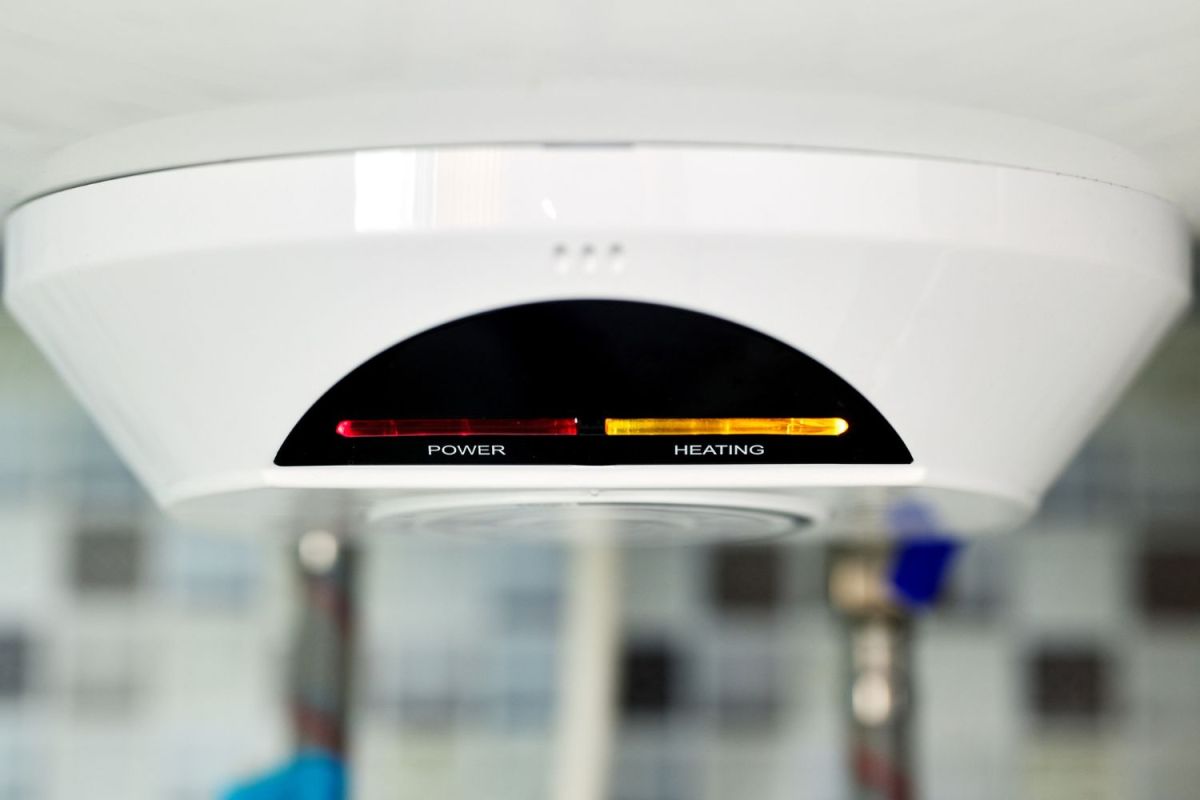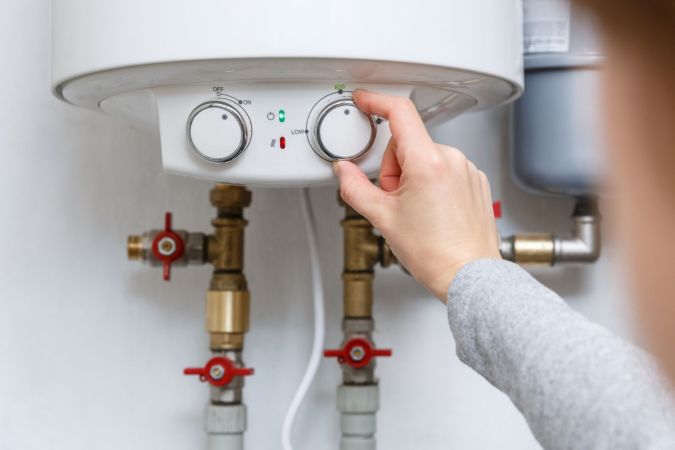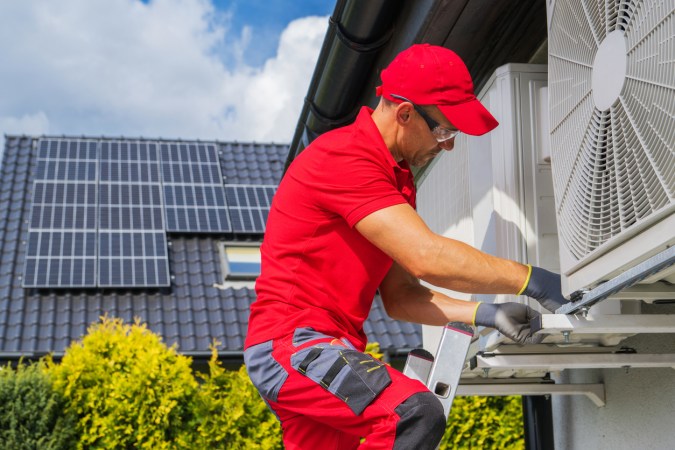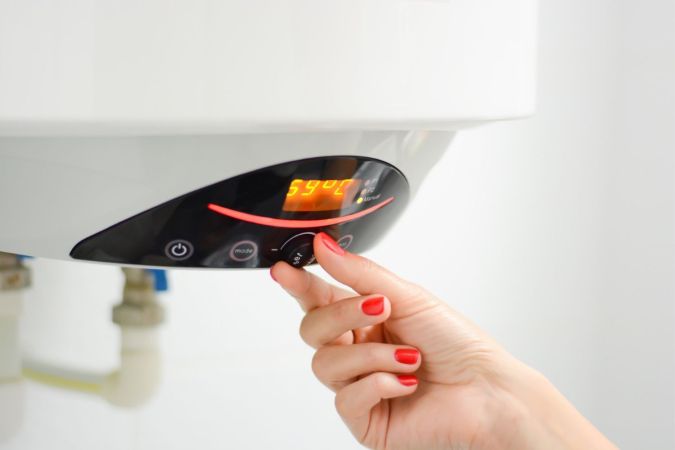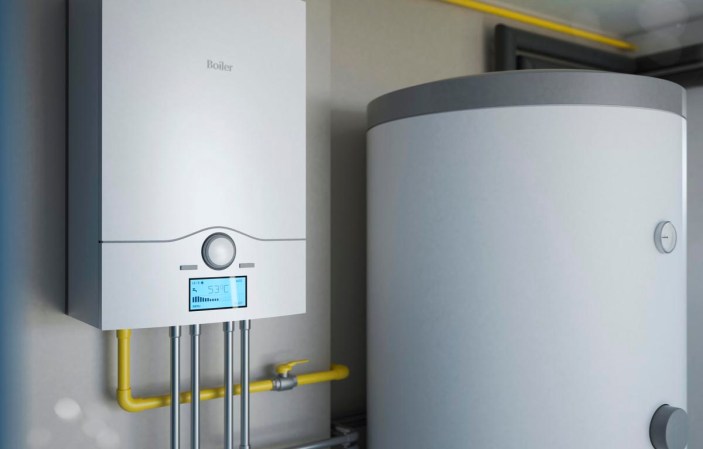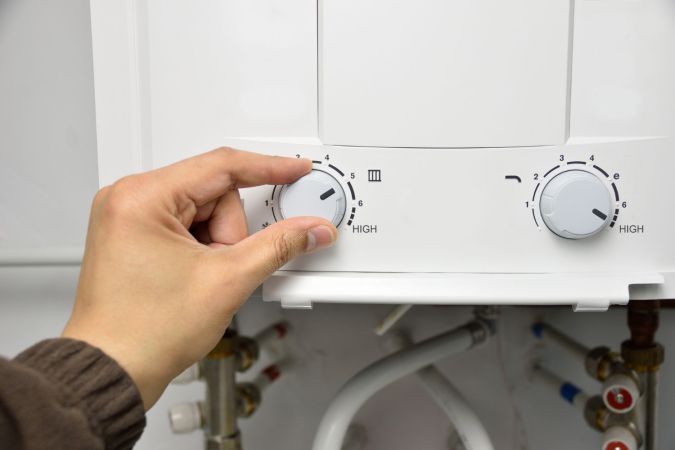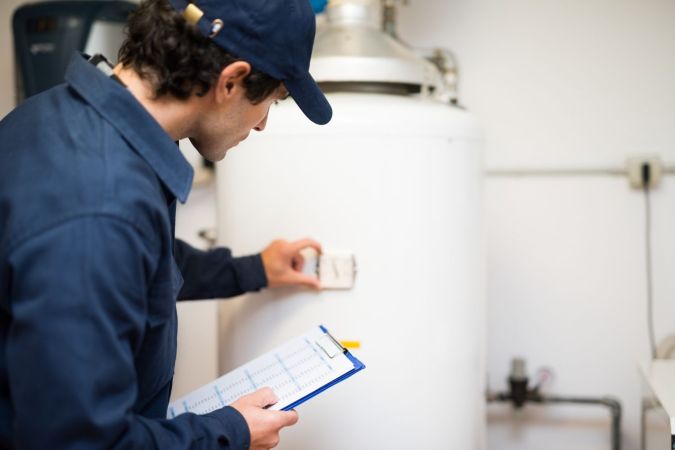We may earn revenue from the products available on this page and participate in affiliate programs. Learn More ›
When it comes to tank vs. tankless water heater cost, several factors come into play that can influence a homeowner’s decision regarding which option is the best fit for their home. Both tank and tankless water heaters have their own advantages and drawbacks, and understanding their differences can help homeowners make an informed choice.
Tank water heaters, also known as conventional or storage water heaters, are the most common type and are typically more affordable. These units store and heat a specific amount of water in a tank, maintaining it at a constant temperature so it’s readily available whenever it’s needed. While the initial cost of a tank water heater is lower than the cost of a tankless unit, it’s important for homeowners to consider additional costs such as energy consumption over time and potential maintenance expenses.
Tankless water heaters, whether powered by electricity or gas, have gained popularity due to their energy efficiency and space-saving design. These units heat water on demand, providing hot water instantly whenever a faucet is turned on. This not only eliminates the need for a storage tank but also reduces energy waste, since there’s no continuous heating of stored water. While the initial cost of a tankless water heater and its installation may be higher than that of a traditional tank water heater, the long-term savings on energy bills can often offset the cost difference. Knowing how a tankless water heater works can help homeowners make the best decision for their home.
Installation plays a significant role in the overall cost comparison between tank and tankless water heaters. Setting up a tank water heater is relatively straightforward, involving connecting the unit to the water supply and energy source. Tankless water heater installation can be more complex, especially if it requires modification to accommodate the increased electrical demand or gas supply. In some cases, the installation of a water heater expansion tank (also known as a water heater thermal expansion tank) may be needed to prevent pressure buildup. This can add to the initial expense, but it’s essential for the safe and efficient operation of the system.
Homeowners considering a tankless water heater have the choice between electric and gas-powered options. Electric tankless water heaters are easier to install and are an excellent choice for homes with limited space or no access to gas lines. They are often smaller and can be installed closer to the point of use, reducing water waste while users are waiting for hot water to reach the faucet. A tankless gas water heater tends to have a higher flow rate and is better suited for a larger household with higher hot water demands.
Solar water tank heaters are environmentally friendly options. These systems use the sun’s energy to heat water, which is stored in a tank for later use. While the up-front costs for a solar water tank heater can be substantial, it can lead to significant savings on energy bills in the long run while contributing to a reduced carbon footprint.
Choosing between a tank and tankless water heater requires careful consideration of several factors, including up-front costs, long-term energy savings, installation requirements, and a household’s specific hot water needs. While tank heaters offer a lower initial price tag, tankless water heaters provide energy efficiency and convenience. Assessing budget size, available space, and overall needs can help homeowners make the right decision for their home.
1. Tankless water heaters, also known as on-demand water heaters, have a much higher installation cost than traditional tank water heaters.
On-demand water heaters come with a higher installation cost when compared with their traditional tank water heater counterparts. The cost difference stems from the more complex installation requirements of tankless water heater systems. Tankless water heater costs run from $1,171 to $3,331, with many homeowners spending $2,216. The overall price depends on the brand, flow rate, and type of heater. Plumbers typically charge between $45 and $150 per hour for installation.
For conventional water heaters, the installation process tends to be relatively straightforward. It involves securing the unit and linking it to the water supply and the energy source. This ease of installation is credited to the self-contained nature of tank water heaters, which store and heat water at a constant temperature. The cost to install a tank water heater ranges from $650 to $2,500 or more, depending on tank size. A natural gas water heater costs between $600 and $2,700, while an electric option runs from $600 to $3,500.
A tankless water heater, sometimes called an instant hot water heater, supplies hot water on demand, without the need for a storage tank. Because the heater is tankless, the installation process is more intricate. Electric tankless water heaters may require an upgrade to the electrical system so it can handle the extra power they require for heating water quickly. Installation of gas-powered tankless water heaters requires an adherence to precise specifications for gas lines and their venting systems. This is important to make sure they work safely and effectively. Tankless water heaters often use a “point of use” setup. This means that to reduce heat loss, smaller units are placed close to where the household will use hot water. Occasionally, extra units may be needed to ensure there is enough hot water for the entire home.
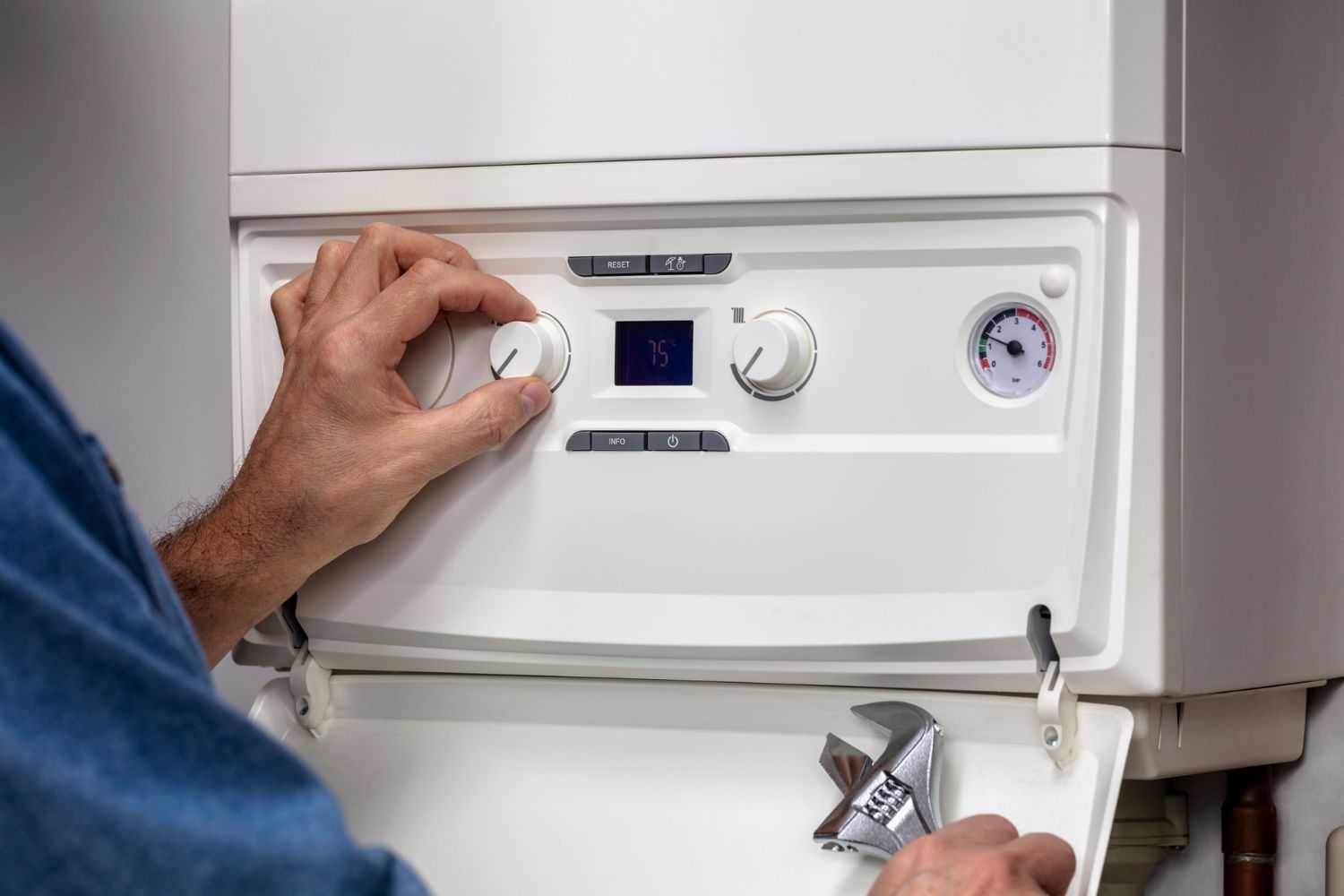
2. Tankless water heaters can be powered by gas or electricity; gas is the pricier option initially, but may have lower utility costs over time.
Tankless water heaters come with the flexibility of being powered by either gas or electricity. While the initial cost of a gas-powered tankless water heater might be higher than for an electric one, it’s important for homeowners to consider the long-term benefits that come with this choice.
Opting for a gas-powered tankless water heater does involve a higher up-front investment due to the cost of the unit itself, installation, and potential requirements for ventilation. It’s worth homeowners noting that gas-powered tankless heaters often offer a few advantages that might balance out the initial cost. One of the significant benefits is potentially lower utility costs over time. Gas-powered units tend to heat water more efficiently and quickly than their electric counterparts. This efficiency can translate into lower energy bills, since less energy is required to heat the water to the desired temperature.
Gas-powered tankless water heaters generally have a higher flow rate, meaning they can supply a larger amount of hot water at once compared to electric units. This can be beneficial for households with high hot water demands, such as large families or homes with multiple bathrooms. The quick and continuous supply of hot water without the need for a storage tank can be a significant convenience.
Electric tankless water heaters typically have a lower initial cost and simpler installation requirements, and they are more suitable for homes without access to natural gas. They may also struggle to keep up with high hot water demands, which might result in higher energy costs, especially in areas with expensive electricity rates.
Even though gas-powered water heaters might require a higher initial investment, their potential for lower utility costs and efficient water heating could make them a financially wise choice in the long run. It’s recommended that homeowners consider their household’s hot water needs, available energy sources, and budget when making the decision between gas and electric tankless water heaters.
3. Storage tank water heaters are much cheaper to install than tankless models, though they are typically less efficient, which can mean higher utility costs.
Storage tank water heaters do present a more affordable installation cost than small tankless water heaters. This up-front cost advantage is an appealing factor for many homeowners who are looking for a budget-friendly option. It’s important for homeowners to understand the trade-offs associated with this choice, particularly in terms of efficiency and long-term utility costs.
Tank water heaters are known for being less efficient than tankless models. The reason behind this is the manner in which they operate. These heaters continuously heat and store a large volume of water in a tank, maintaining it at a constant temperature even when the hot water is not being used. This continuous heating process can lead to what’s known as “standby heat loss,” where energy is expended to keep the stored water hot, even if no one is using it. This inefficiency can result in higher energy bills over time.
In contrast, tankless water heaters are designed to heat water on demand. They don’t store hot water but instead heat it as it flows through the unit. This type of heating method eliminates the standby heat loss issue, making tankless models significantly more energy efficient.
4. Traditional tank water heaters have a shorter lifespan than their tankless counterparts, so homeowners will likely need to pay to replace them sooner.
It’s worth it for homeowners to consider the lifespan of both types of water heater options. Traditional water heaters do have a relatively shorter lifespan than tankless models, which can result in homeowners needing to plan for replacement sooner than they might with tankless units.
Traditional tank water heaters typically have a lifespan of around 8 to 12 years, depending on factors such as usage, maintenance, and the quality of the unit. This means that homeowners might find themselves budgeting for water heater replacement costs within a decade or less. On the other hand, tankless water heaters are known to have a longer lifespan, often ranging from 15 to 20 years or more. This extended lifespan can certainly be a significant advantage in terms of long-term cost savings. Knowing when to replace a water heater and whether to replace a water heater before it fails are important factors every homeowner would benefit from knowing.
Although tankless water heaters do have a longer lifespan, they do come with a higher up-front cost and potentially more complex installation requirements. This can offset the advantage of their extended lifespan to some extent. It’s recommended that homeowners weigh the initial investment against the potential longer period before replacement and consider other factors as well, such as energy efficiency, hot water demands, and overall budget.
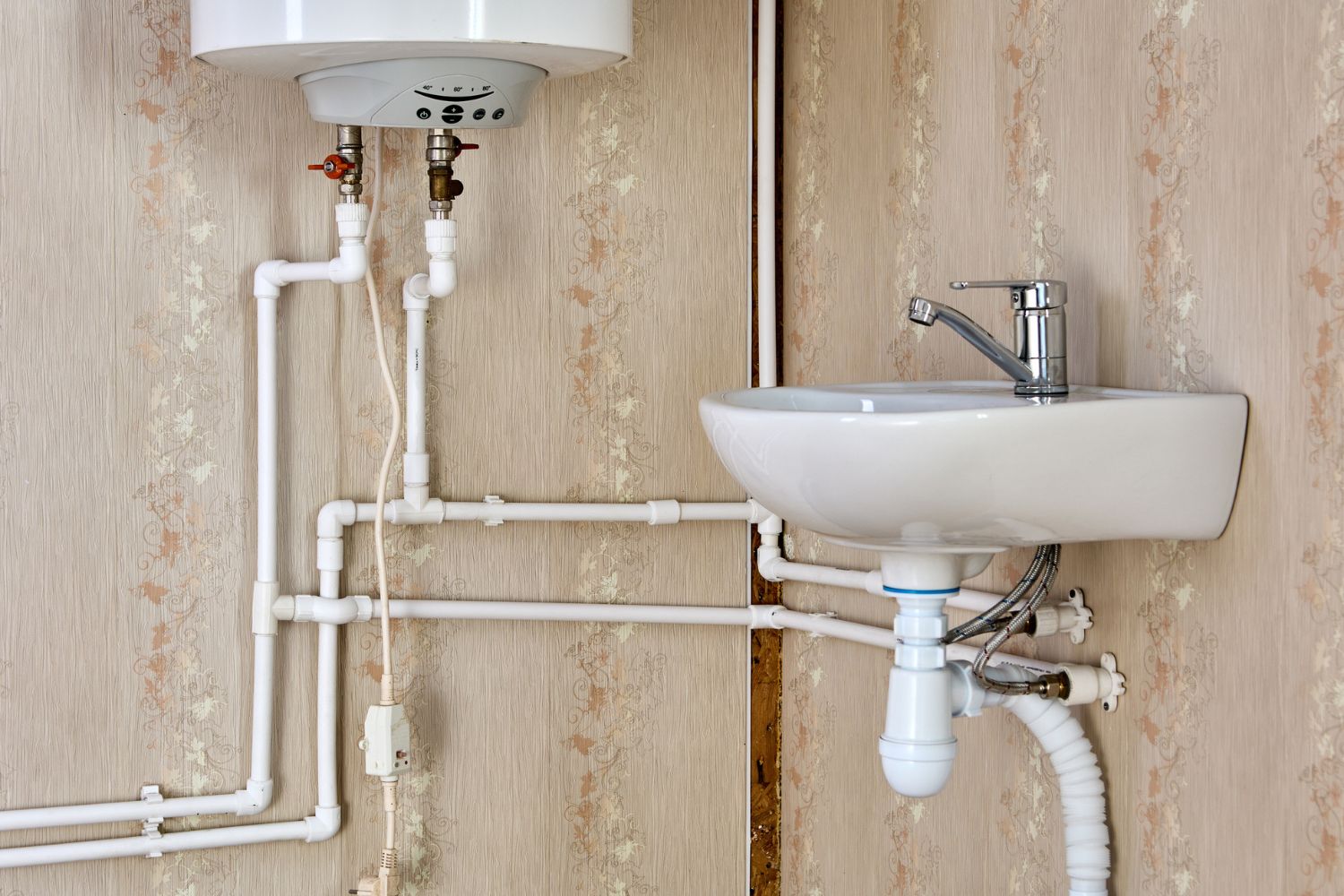
5. Tank water heaters have lower maintenance and repair costs than tankless water heaters, as they have fewer mechanical components.
Water heater maintenance and water heater repair costs are important factors for homeowners to consider when comparing traditional water heaters and tankless water heaters. Traditional tank water heaters typically have lower maintenance and repair costs than tankless ones due to their simpler design with fewer mechanical components.
Traditional tank water heaters operate with a relatively straightforward design. They heat and store water in a tank, relying on a thermostat and a heating element or gas burner to maintain the desired temperature. This simplicity translates into fewer potential points of failure and less-complex maintenance requirements. Regular maintenance for tank water heaters often involves tasks such as draining the tank to remove sediment buildup, checking the pressure relief valve, and ensuring the overall safety of the unit. Understanding why an electric water heater isn’t working or why a water heater is making noise can help homeowners remedy various types of hot water issues in their home.
Tankless water heaters are more intricate in their design. They heat water on demand as it flows through a heat exchanger, which involves more advanced technology and additional components, such as sensors, electronic controls, and fans for exhaust. While these components enhance the efficiency and precision of tankless water heaters, they can also contribute to a higher likelihood of maintenance needs or potential repairs over time. The overall maintenance and repair costs for tankless water heaters can vary depending on factors such as the quality of the unit, usage patterns, and proper installation. Performing routine maintenance for tankless units includes descaling to prevent mineral buildup, checking sensors and controls, and ensuring proper ventilation.
6. Tankless water heaters may require periodic flushing if installed in a home with a hard water supply, as well as sediment filter cleaning, and these maintenance costs can add up over time.
Maintenance is a key consideration when homeowners are evaluating the pros and cons of tankless water heaters. While these units offer energy efficiency and a continuous supply of hot water, they do come with their own set of maintenance requirements, especially when installed in homes with hard water.
Hard water contains minerals such as calcium and magnesium, which can accumulate in the heat exchanger of a tankless unit. Flushing involves removing these mineral deposits to maintain the unit’s efficiency and prevent reduced heating performance. While this task does involve additional maintenance costs, it’s essential for preserving the lifespan and functionality of the system. Some tankless water heater models are equipped with sediment filters that need regular cleaning. These filters are designed to capture debris and sediment before they reach the unit, ensuring smooth operation.
7. Switching from a traditional tank water heater to a tankless one will likely require additional plumbing and electrical or gas work, increasing the overall costs.
Transitioning from a traditional tank water heater to a tankless model is a decision that involves the consideration not only of benefits but also associated costs. Making this switch typically entails additional plumbing and potentially electrical or gas work, which can contribute to the overall expenses.
When homeowners switch to a tankless water heater, there are a few important factors for them to take into account. The installation process might involve reconfiguring the plumbing system to accommodate the on-demand heating mechanism of the tankless unit. This can include adjusting pipe sizes, rerouting water lines, and ensuring proper water flow and pressure. This plumbing work will increase the overall cost of materials and labor.
Gas-powered tankless water heaters require a dedicated gas line to provide the necessary fuel. If a home doesn’t already have a suitable gas line, installing one could involve additional construction work, permitting, and coordination with local utility providers. If a homeowner is considering an electric tankless water heater, they might need to upgrade their electrical system to handle the increased load, which could include adding a higher amperage circuit and potentially a new electrical panel.
Even though the initial investment for a tankless water heater might be higher, the added costs for installation and any required modifications also need to be factored into the overall budget. It’s worth noting that while the up-front costs might be substantial, the potential long-term energy savings and other benefits of a tankless unit can help offset these expenses over time. From speaking with a professional who installs water heaters to a professional who fixes water heaters, consulting with contractors, obtaining accurate installation quotes, and evaluating the return on investment in terms of energy savings and improved efficiency can guide homeowners toward a well-informed choice.
8. Tankless water heaters cost more up front but are more space- and energy-efficient and longer-lasting than tank water heaters, which can make the initial cost worth it for some homeowners.
The decision between a tankless water heater and a traditional tank water heater involves careful evaluation of various factors, including up-front and long-term costs, energy efficiency, space considerations, and overall value. Tankless water heaters, despite their higher initial cost, can offer distinct advantages that might make the investment worthwhile for certain homeowners.
When it comes to initial costs, it’s true that tankless water heaters generally have a higher price tag than traditional tank units. This includes the cost of the unit itself as well as potential installation expenses, especially if adjustments to plumbing, gas lines, or electrical systems are needed. It’s recommended that homeowners look beyond these initial expenses and consider long-term advantages.
First, tankless water heaters are known for their energy efficiency. Since they heat water on demand, they don’t continuously maintain a large tank of hot water, eliminating the standby heat loss that occurs with traditional tanks. This efficiency translates into potential savings on energy bills over time. Another advantage is the space efficiency of tankless heaters. They are compact and can be wall-mounted, freeing up valuable floor space that would otherwise be taken up by a traditional water heater. This can be particularly beneficial for smaller homes where space is at a premium.
The longer lifespan of tankless water heaters is also a significant advantage. With proper maintenance, these units can last 15 to 20 years or more, which is notably longer than the typical 8- to 12-year lifespan of traditional tank water heaters. Ultimately, the decision to invest in a tankless water heater should align with a homeowner’s specific needs, preferences, and budget. While the initial cost might be higher, the combination of energy efficiency, space savings, and extended lifespan can provide value for those who are looking for a more efficient and durable hot water solution.

